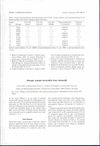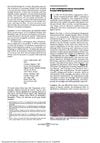 15 citations,
January 1995 in “Archives of Dermatological Research”
15 citations,
January 1995 in “Archives of Dermatological Research” Minoxidil boosts elastin production, potentially helping skin diseases.
 14 citations,
September 2003 in “Archives of Dermatology”
14 citations,
September 2003 in “Archives of Dermatology” Finasteride may not stop severe hair loss after stopping minoxidil.
 14 citations,
July 1987 in “Contact Dermatitis”
14 citations,
July 1987 in “Contact Dermatitis” A small percentage of minoxidil users may develop an allergic skin reaction.
 13 citations,
November 2014 in “Pediatric emergency care”
13 citations,
November 2014 in “Pediatric emergency care” Ingesting minoxidil can cause serious heart issues; keep away from children and improve packaging.
 13 citations,
December 2010 in “Archives of Dermatology”
13 citations,
December 2010 in “Archives of Dermatology” Minoxidil use can cause trichostasis spinulosa in long-term hair loss patients.
 13 citations,
April 2009 in “Acta Medica Scandinavica”
13 citations,
April 2009 in “Acta Medica Scandinavica” Minoxidil lowers blood pressure and causes hair growth, with some side effects.
 12 citations,
May 1989 in “Postgraduate Medicine”
12 citations,
May 1989 in “Postgraduate Medicine” The document concludes that hair loss is common and can be treated with medications like minoxidil or surgical options, and it significantly affects people's psychological well-being.
 11 citations,
January 2020 in “Skin appendage disorders”
11 citations,
January 2020 in “Skin appendage disorders” Low-level laser therapy safely and effectively improves hair growth and coverage for male and female pattern hair loss.
 11 citations,
May 2019 in “Journal of Cosmetic Dermatology”
11 citations,
May 2019 in “Journal of Cosmetic Dermatology” Mesotherapy helps treat male hair loss effectively.
 11 citations,
December 2010 in “Archives of Dermatology”
11 citations,
December 2010 in “Archives of Dermatology” A man with rare skin changes on his fingers was diagnosed with multiple myeloma-linked amyloidosis.
 11 citations,
January 2002 in “Dermatologic Surgery”
11 citations,
January 2002 in “Dermatologic Surgery” Using minoxidil before and after facelift surgery can effectively prevent temporary hair loss without causing other complications.
 11 citations,
April 1993 in “Chest”
11 citations,
April 1993 in “Chest” Man drank minoxidil, caused low blood pressure and fast heartbeat, treatment helped but led to heart damage.
 10 citations,
August 2012 in “Current Problems in Pediatric and Adolescent Health Care”
10 citations,
August 2012 in “Current Problems in Pediatric and Adolescent Health Care” Hair changes can indicate systemic diseases or medication effects.
 9 citations,
April 2018 in “JAMA Dermatology”
9 citations,
April 2018 in “JAMA Dermatology” Topical minoxidil improves hair loss in 80% of women with breast cancer undergoing endocrine therapy.
 9 citations,
January 1992 in “Contact Dermatitis”
9 citations,
January 1992 in “Contact Dermatitis” Some people using minoxidil for hair loss developed an allergic skin reaction, often related to an ingredient that helps minoxidil work better.
 8 citations,
January 2020 in “Skin appendage disorders”
8 citations,
January 2020 in “Skin appendage disorders” Saw palmetto supplements may modestly improve hair regrowth with few side effects, but more research is needed.
 8 citations,
June 2019 in “Journal of Cosmetic Dermatology”
8 citations,
June 2019 in “Journal of Cosmetic Dermatology” Using a nonablative fractional laser with topical minoxidil can effectively and safely promote hair regrowth in alopecia areata patients.
 8 citations,
January 2016 in “European Journal of Plastic Surgery”
8 citations,
January 2016 in “European Journal of Plastic Surgery” PRGF treatment is safer and more effective for hair loss than topical minoxidil.
 8 citations,
January 2003 in “Plastic and Reconstructive Surgery”
8 citations,
January 2003 in “Plastic and Reconstructive Surgery” Hair transplants using follicular unit grafting can significantly improve appearance for men with advanced hair loss.
 8 citations,
January 2003 in “Plastic and Reconstructive Surgery”
8 citations,
January 2003 in “Plastic and Reconstructive Surgery” Hair transplants using follicular unit grafting and a strategic design can give great results even for men with severe hair loss.
 7 citations,
March 2020 in “Lasers in Medical Science”
7 citations,
March 2020 in “Lasers in Medical Science” LLLT is a safe, promising hair loss treatment, but more research needed.
 7 citations,
October 2019 in “Evidence-based Complementary and Alternative Medicine”
7 citations,
October 2019 in “Evidence-based Complementary and Alternative Medicine” Chinese medicine may help hair growth and reduce hair loss in androgenetic alopecia.
 6 citations,
May 2020 in “Pharmacology Research & Perspectives”
6 citations,
May 2020 in “Pharmacology Research & Perspectives” A new gel form of minoxidil is equally effective for hair growth and safer for the heart and other organs than the traditional solution.
 6 citations,
June 2019 in “Skin Research and Technology”
6 citations,
June 2019 in “Skin Research and Technology” Finasteride works for hair loss by maintaining existing hair follicles, not reversing miniaturization.
 6 citations,
April 2019 in “Journal of Cosmetic Dermatology”
6 citations,
April 2019 in “Journal of Cosmetic Dermatology” Hair loss affects women's self-esteem; treatments like minoxidil can help.
 6 citations,
November 2017 in “Skin appendage disorders”
6 citations,
November 2017 in “Skin appendage disorders” Topical botanical lotion increases hair density and improves quality of life in women with hair loss.
 6 citations,
October 2015 in “International Journal of Women's Dermatology”
6 citations,
October 2015 in “International Journal of Women's Dermatology” Hair aging is inevitable, but using the right hair care products can help maintain hair health.
 6 citations,
November 1996 in “Archives of Dermatology”
6 citations,
November 1996 in “Archives of Dermatology” A man's relapsed leprosy was successfully treated with the antibiotic sparfloxacin.
 5 citations,
January 2021 in “Journal of Cosmetic Dermatology”
5 citations,
January 2021 in “Journal of Cosmetic Dermatology” Topical cetirizine 1% promotes hair growth in male androgenetic alopecia patients.
 5 citations,
January 2021 in “Journal of Cosmetic Dermatology”
5 citations,
January 2021 in “Journal of Cosmetic Dermatology” Adding platelet-rich plasma improves hair density and thickness in androgenetic alopecia.






























